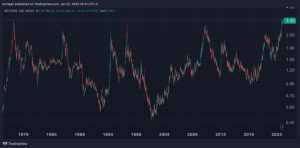
As the possibility of a Kamala Harris presidency looms, high-income earners across the country are increasingly concerned about how potential changes to tax policy might affect their finances.
While wealthy people nationwide could feel the impact, experts suggest that residents of certain states may bear the brunt of the changes.
Don’t Miss:
Cliff Ambrose, founder and wealth manager at Apex Wealth, said that states already saddled with high taxes, such as California and New York, could see the most significant financial hits.
Similarly, Anthony DeLuca, a financial planner at Annuity.org, warns that high-tax and tax-friendly states could face shifts, particularly if federal tax increases are implemented.
Trending: Elon Musk and Jeff Bezos are bullish on one city that could dethrone New York and become the new financial capital of the US. Investing in its booming real estate market has never been more accessible.
“If Kamala Harris wins, states like California and New York are likely to see upper-class paychecks take a hit,” Ambrose told GOBankingRates. “Both states already have high state income taxes and Harris’s proposed tax increases on higher earners could further reduce take-home pay for the wealthy.”
DeLuca agrees, emphasizing that any state with a state income tax will become more burdensome to upper-class members.
Trending: A billion-dollar investment strategy with minimums as low as $10 — you can become part of the next big real estate boom today.
He pointed to New York in particular, where people might face “a 43.9% federal-state capital gains tax” if Harris wins. DeLuca also noted that New York and California are home to the most S&P 500 headquarters, suggesting that the concentrations of major corporations in high-tax states could have wider economic consequences.
States without income taxes may not escape the impact of potential changes.
“In states like Florida, which doesn’t have a state income tax, the impact could come from federal tax increases rather than state-level changes,” Ambrose said.
That suggests even upper-class residents in tax-friendly states could see changes in their paychecks due to possible shifts in federal tax policy.
Trending: Warren Buffett once said, “If you don’t find a way to make money while you sleep, you will work until you die.” These high-yield real estate notes that pay 7.5% – 9% make earning passive income easier than ever.
DeLuca also highlighted New Jersey and Massachusetts as states where upper-class incomes could be significantly impacted. He noted that these states, along with New York and California, “will rise above the 40% mark” in combined federal and state tax rates for high-income earners.
While much attention is on income and capital gains taxes, DeLuca highlighted another critical factor: energy policy. States heavily reliant on fossil fuel industries could experience economic shifts under a Harris administration.
“Wyoming produces 41% of U.S. coal production,” he said. “Any employer or family business grounded in this industry would be at serious risk from [Harris’s] economic and energy administration ideas.”
Trending: Will the surge continue or decline on real estate prices? People are finding out about risk-free real estate investing that lets you cash out whenever you want.
DeLuca also mentioned New Mexico, which accounted for 13% of U.S. crude oil production in 2022, could face challenges if funding shifts toward alternative energy sources.
Understanding the potential changes under a Harris administration involves recognizing they are part of a larger policy agenda. Harris’s proposed tax increases on high earners aim to fund programs like health care and infrastructure, potentially impacting the broader economy.
See Also: This Jeff Bezos-backed startup will allow you to become a landlord in just 10 minutes, and you only need $100.
DeLuca emphasized that many states poised for the most substantial effects on upper-class paychecks are also key national gross domestic product players. This highlights the complex relationship between tax policy, economic growth and income distribution.
It’s important to remember that campaign proposals are just that – proposals. They don’t always become law as envisioned, as any legislative changes must navigate the complexities of Congress.
Read Next:
© 2024 Benzinga.com. Benzinga does not provide investment advice. All rights reserved.



